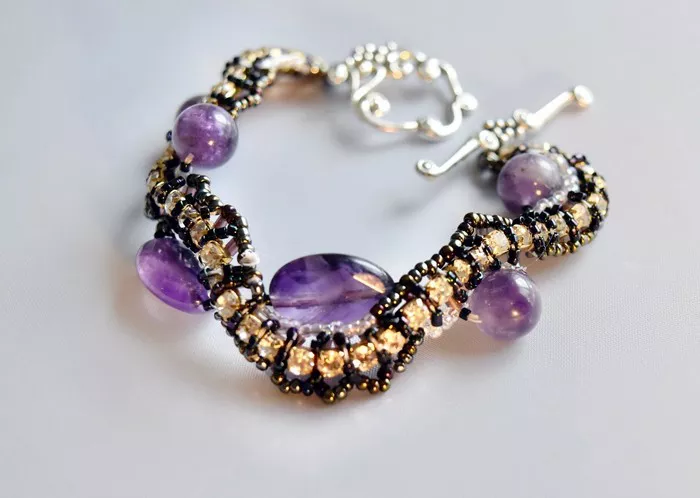Bracelets, those delicate adornments encircling wrists, have been more than mere fashion statements throughout history. Across cultures and time periods, bracelets have symbolized a myriad of sentiments, from friendship and affection to fidelity and devotion. In this article, we delve into the multifaceted symbolism of bracelets, exploring how they serve as tangible expressions of human connection and emotion.
Friendship Symbolism:
Bracelets are often revered as symbols of friendship, serving as tangible reminders of the bonds shared between individuals. Exchanged as tokens of affection and camaraderie, these accessories hold significant sentimental value. The act of gifting a bracelet to a friend is a gesture of trust and admiration, symbolizing the desire for a lasting connection.
One of the reasons bracelets are popular choices for friendship tokens is their visibility. Positioned prominently on the wrist, they serve as constant reminders of the bond shared between friends. Moreover, the customizable nature of bracelets allows for personalization, with charms, engravings, and designs reflecting the unique interests and personalities of both the giver and the recipient.
Love and Affection:
Beyond friendship, bracelets are commonly bestowed as symbols of love, affection, and appreciation. Different types of bracelets can convey varying degrees of intimacy and sentiment, making them versatile gifts for expressing romantic feelings or familial bonds.
For instance, a simple gold band may symbolize eternal love and commitment, while intricately designed bracelets adorned with gemstones or meaningful symbols can signify deep emotional connections. The act of giving and receiving a bracelet as a token of love is a profound expression of affection and devotion, encapsulating the bond shared between individuals.
Fidelity and Devotion:
Throughout history, bracelets have been worn as symbols of fidelity and devotion, representing the commitment between partners or loved ones. In many cultures, the exchange of bracelets is accompanied by rituals and ceremonies signifying the solemnity of the bond.
Moreover, bracelets have been imbued with magical properties, believed to ward off evil spirits and protect the wearer from harm. These talismanic qualities add layers of significance to bracelets as symbols of fidelity and loyalty, reinforcing the bond between individuals and safeguarding their relationship against external forces.
Loyalty and Vulnerability:
Wearing a bracelet on the wrist symbolizes more than just adornment; it represents vulnerability and openness to connection. By donning a bracelet, individuals expose themselves to potential harm, both physical and emotional, demonstrating their willingness to engage in meaningful relationships despite the risks.
The passing down of bracelets through generations further underscores the theme of loyalty within families, as these heirlooms carry the memories and traditions of past generations, linking the present with the past. In this way, bracelets serve as tangible symbols of familial bonds and the enduring connections that transcend time.
Other Symbolisms:
Beyond the realms of friendship, love, and fidelity, bracelets hold additional symbolic meanings in various cultures and contexts. In some societies, bracelets are associated with purity, chastity, and modesty, particularly when worn as part of religious or ceremonial attire.
Furthermore, bracelets are often seen as symbols of power, strength, wealth, and healing properties. In ancient civilizations, rulers and leaders adorned themselves with ornate bracelets to signify their authority and status, while certain materials and designs were believed to possess mystical qualities capable of bestowing protection and healing.
In conclusion, bracelets are more than just accessories; they are tangible expressions of human connection and emotion. From friendship and love to fidelity and loyalty, bracelets serve as symbols of the bonds that unite us, transcending cultural and temporal boundaries. Whether exchanged between friends, lovers, or family members, the act of giving and receiving a bracelet is a profound gesture that speaks volumes about the depth of our relationships and the emotions that bind us together.
FAQs
1. What is the purpose of wearing a bracelet?
Bracelets serve various purposes, ranging from fashion accessories to symbolic or cultural significance. They can complement an outfit, add a touch of personal style, or convey a message or belief. Additionally, bracelets can be worn for sentimental reasons, such as reminders of special occasions or relationships. Some people believe that certain types of bracelets, such as those made of certain materials or featuring specific symbols, hold protective or healing properties.
2. What do bracelets mean on each hand?
In some cultures and traditions, wearing bracelets on different hands can carry distinct meanings. For example, in certain Eastern cultures, wearing bracelets on the left hand symbolizes receiving energy, while wearing them on the right hand signifies giving energy. However, interpretations may vary widely depending on cultural beliefs, personal preferences, and individual customs.
3. What is the significance of beaded bracelets?
Beaded bracelets hold diverse significance across cultures and individuals. They can symbolize spirituality, protection, or connection to nature. In some traditions, each bead may represent a prayer, intention, or milestone. Beaded bracelets are also popular choices for friendship bracelets, serving as tangible reminders of the bond between friends or loved ones.
4. What does it mean if a girl gives me a bracelet?
The meaning behind a girl giving you a bracelet can vary depending on the context of your relationship and her intentions. It could be a gesture of friendship, affection, or romantic interest. In some cases, the bracelet may carry personal significance, such as representing a shared memory or inside joke. Regardless of the specific meaning, receiving a bracelet from someone often signifies a meaningful connection and serves as a symbol of their thoughtfulness and care.

